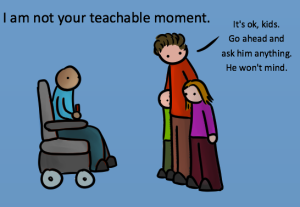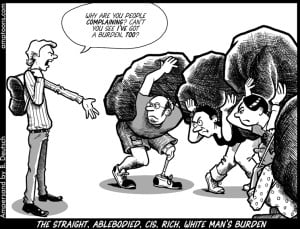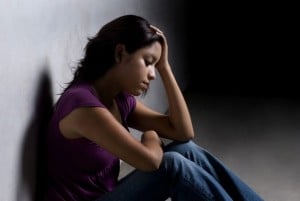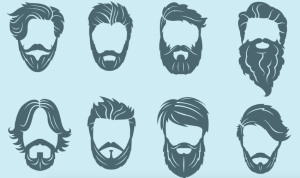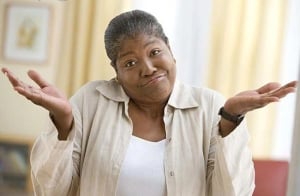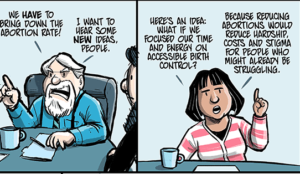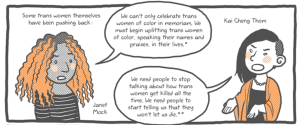Originally published on The Body Is Not an Apology and republished here with permission.
My very first experience of shame (that I can remember) occurred in the third grade after my family had emigrated from the Philippines to Canada.
We were asked what we had had for breakfast that morning, and I volunteered “vegetable soup!” as an answer. In response, I heard a chorus of laughter and a “What kind of weirdo has soup for breakfast?”
On the surface, this incident seems completely benign.
For many years, I chalked it up to the kinds of cruelty children are prone to at that age. But this experience, and so many similar ones in the following years, hinted at a lesson this particular society wanted to teach me – that everything I had learned about who I was before immigrating was backwards.
These experiences subtly piled up until I couldn’t see over them. I began to formulate a list of what was right and wrong in this new world, and I avoided anything that fell in the latter category. Being in school put me onto the fast track of forgetting (or, more accurately, dismissing) my roots in order to feel that I belonged.
The daily practices that I was accustomed to faded and were replaced with the practices of whiteness.
The practice of eating with my hands, so rooted in the belief that people should have a profound relationship with what they eat, ceased – because I had begun to think it was uncivilized.
My parents lost their hero-status, especially my dad. They weren’t sophisticated enough, smart enough, well-read enough, white enough. I judged them against a backdrop that would never show them in their true light. I was judging them in the same light in which I was judged at school.
I was rude and disobedient at times, not only because I was trying to assess my boundaries and navigate the waters of growing up, but also because I felt I was somehow on my way to becoming a better person than my parents.
My dad is the most affectionate and loving person I know, and I left him hanging so many times when he reached out to hold my hand. It was such a burden. I couldn’t understand why he’d try to embarrass me.
Now, I can write a list of reasons why I should’ve taken his hand in mine with pride. Now I understand all the things he meant to say with that gesture: I don’t want to lose you. Don’t go too far. I love you. Be safe. Stay.
Stay – a word that transcends all geographical meaning. Stay – meaning: Talk to me about your life. Speak our language. Don’t deny where you’re from.
Years down the road, it’s been painful to realize how wrong-minded I’d been to cut off these imaginary limbs to fit in.
How I adored it when my friends would say, “You’re basically white, though.”
As if I’d achieved some great feat when, all the while, I was denying my roots and my family. I couldn’t see how hard my dad was trying to navigate his own ocean of insecurities and displacement. I couldn’t see how hard my mom worked trying to make sure we would be fed and comfortable.
At home, I only spoke English. I entered the business of forgetting, where the transactions were constant and subtle, but enduring. I zoned in on dissociating from my roots. It was my way of apologizing to a world I never owed.
I try to reconcile the person I was back then with who I am now. I try to have some kind of forgiveness and understanding of the situation. I think it’s important for trying to grow.
We were all just trying to survive in a place that wasn’t home.
Still, sometimes it’s hard for me to fathom the depth of my forgetting. And I wonder how it is that some of my friends, who were in the same situation, managed to retain their language, their traditions, and their pride in them.
I know there are many factors in play – if I just knew what they were, it would make this return home so much easier. It haunts me whenever someone asks me if I speak Ilocano or Tagalog, and I have to awkwardly explain that “I understand most of it, but I don’t really speak it. I’m too insecure.”
Too insecure to speak the language I grew up speaking, too insecure to ask for help, too afraid of going back home because everything, including myself, has changed. Of course it has.
This story is only one of millions. Here are the things I wish I had known and the things I wish someone had told me:
- You aren’t backwards.
- Continue to speak Ilocano at home, and you’ll yearn for how comfortable the words are in your mouth down the road.
- Your mom works three jobs and takes care of you – she isn’t only a wife.
- Your dad is going through the same journey as you – don’t ignore him at school when you see him go to his ESL course.
- Having soup for breakfast isn’t ridiculous.
- Don’t sit across the table from your family and wish you had another just because someone told you your family is wrong.
- It’s okay to tell someone when they’re hurting you – not being able to speak English doesn’t mean you don’t have a voice.
These days, I challenge myself to stand in a place that’s rooted in love and to be free of judgment about who I used to be.
I try to recount all the memories I have of mountains and bare feet, heat and familiar faces I’d cast into strangeness.
I try to feel the loudness of their living back home when I was eight, the unapologetic truth of their lives ringing through the walls so clearly in the morning, how that comforted me. There was no shame back then, and there shouldn’t be now.
I sometimes get caught up in thinking that I couldn’t connect with anyone in the Philippines now because everything has changed, because I can’t speak Ilocano, because they probably think I’m spoiled.
But my friend Paul recently told me, “Just go. Drop whatever judgment or expectation you have of yourself and others, and just go. It’s waiting for you. Whatever the experience is, it’ll be yours. It’ll be yours to transform if you have to.”
I seriously play with this idea now, and I plan to go back. I have to encourage myself to be brave and to explore the places I’d forgotten and have been rebuilding in my head. I’m letting go of my shame and guilt and all the emotions that tend to stick to them: sadness, grief, anger, jealousy.
I don’t want to continue living a life that refuses to acknowledge all the other parts of me, the parts that aren’t white. I want to regain my pride in all of it.
As Olivia Wilson says with regard to shame and pride, “It is really about a choice between conforming oneself to live with the world and asking the world to live with you.”
[do_widget id=’text-101′]
Search our 3000+ articles!
Read our articles about:
Our online racial justice training
Used by hundreds of universities, non-profits, and businesses.
Click to learn more






